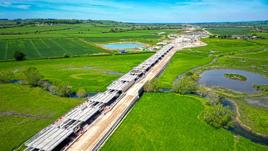In a bid to revitalise the UK's infrastructure systems, the government has announced the establishment of a new National Infrastructure and Service Transformation Authority (NISTA). Speaking at Skanska's headquarters, Chief Secretary to the Treasury Darren Jones outlined the government's vision for a decade of national renewal.
Jones said: “This new body will get a grip on the delays to infrastructure delivery that have plagued our global reputation with investors. It will restore the confidence of businesses to invest and help break the cycle of low growth.”
The new watchdog will replace the National Infrastructure Commission (NIC) and the Infrastructure and Service Transformation Authority.
Responding to the Government’s announcement of a new National Infrastructure and Service Transformation Authority, Ben Curtis from Campaign for Better Transport said:
“This is a very welcome decision, and we hope that this new body will revive the delivery of vital national infrastructure. To expand our public transport networks and get more people travelling sustainably, it is essential that the necessary infrastructure is built efficiently and cost-effectively. Spending on rail and bus infrastructure yields high returns in the wider economy, and we are hopeful that the announced ten-year national strategy will prioritise much-needed sustainable transport projects.”
It is expected that the new body will play a pivotal role in streamlining infrastructure strategy and delivery and bring oversight to major infrastructure projects including HS2, TransPennine Route Upgrade and the Lower Thames Crossing. The new authority will seek to address the systemic challenges that have hindered progress in the past.
Some of those issues were highlighted in a new report released yesterday (October 10) by NIC, which said that costs on major infrastructure projects had seen costs driven up by a combination of conflicting objectives within government, risk aversion and fragmentation within the industry. The report also highlighted that the lack of strategic clarity has seen increases in the delay of decisions for national infrastructure by up to 65% since 2012.
It has recommended that clear strategic direction from government and better specification and cost management in the supply chain was needed alongside better regulation overall of infrastructure projects.
The announcement comes as the UK faces increasing pressure to improve its infrastructure, particularly in comparison to other G7 nations. Statistics have shown that the UK has historically lagged behind its peers in terms of infrastructure investment and public capital stock.
The government's ten-year infrastructure strategy, which is currently being developed will outline its objectives and priorities for the nation's infrastructure.
















Login to comment
Comments
No comments have been made yet.